Governing Citizens’ Assemblies: Lessons from France and Beyond
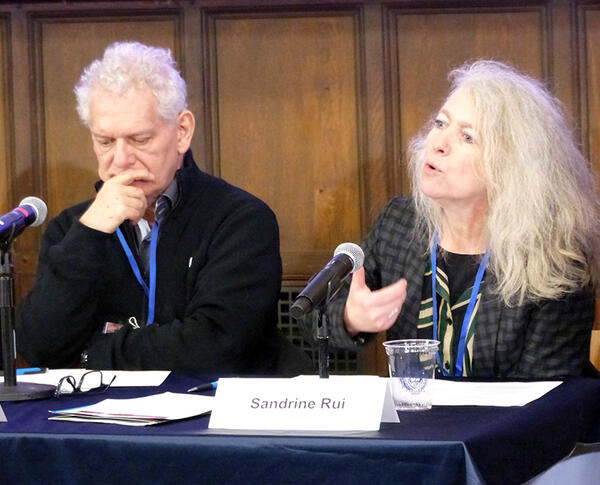
In France, drivers are required to keep a reflective yellow vest in their vehicles to wear during roadside emergencies. In 2018, in opposition to a rise in fuel taxes, protesters declared a democratic emergency, adopting the handy high-visibility items as a uniform for weekly demonstrations calling for government action to alleviate economic inequality.
As the protests continued and occasionally grew violent, French President Emmanuel Macron responded by staging a nationwide “Great Debate” and convening a Citizens’ Convention for Climate, comprised of 150 randomly selected people charged with deliberating over and recommending solutions for the growing dangers of global climate change. But the most radical proposals never made it to the promised public referendum.
This attempt at governing through a deliberative body chosen by lottery may have fallen short of supporters’ goals to bolster public confidence in democracy and enhance policymaking. But in the years before and since, such citizen’s assemblies have gained traction in Europe. In 2016, Ireland established such a body to debate the legality of abortion. In 2017, the United Kingdom held a citizens’ assembly to help determine how to navigate relations with the European Union following Brexit. In 2022, France held a citizens’ convention on the future of laws relating to assisted suicide and euthanasia.
Hélène Landemore, a professor of political science and a faculty fellow with Yale’s Institute for Social and Policy Studies (ISPS), served on the governance committee of the 2023 French Citizens’ Convention on End-of-Life. Earlier this month, she organized a conference at ISPS on how to best govern such assemblies, convening expert researchers, practitioners, and citizen participants — all eager to find a way forward.
“Who should have power in citizen’s assemblies?” Landemore said, summarizing the questions on the agenda. “For what purpose? And depending on how we answer these questions, how should we design, change, or reform the governance of citizen’s assemblies, if at all?
Alan Gerber, director of ISPS and Sterling Professor of Political Science, expressed his excitement over the pathbreaking nature of the event.
“It was amazing to see organizers of these assemblies, academics who theorize about them, and citizens who participated in these conventions all interact in such a respectful and productive manner,” Gerber said. “In real time, we witnessed citizens push back against some of the assumptions about their role in these assemblies. This wonderfully illustrates the value of citizen science that Hélène so often advocates for in democratic theory research.”
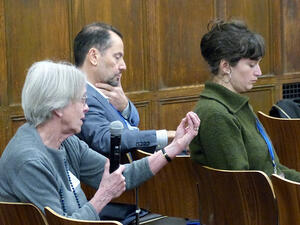
The conference overlapped with a second conference on Governing Artificial Intelligence, part of a series that Landemore calls Governing X, convening researchers, industry representatives, and policy experts to address an assortment of concrete governance problems from a theoretical, practical, and prescriptive perspective.
The “Governing Citizen’s Assemblies” conference was sponsored by ISPS’s Democratic Innovations program and The Whitney and Betty MacMillan Center for International and Area Studies at Yale with support from the Edward J. and Dorothy Clarke Kempf Fund. Led by Landemore and ISPS faculty fellow Adam Meirowitz, Democratic Innovations aims to identify and test new ideas for improving the quality of democratic representation and governance.
Landemore said the French conventions on climate and end-of-life issues were the first to raise to prominence the importance of how such assemblies should be organized and run. Committees of appointed experts typically governed, steered, or piloted prior efforts.
“This fact has been glossed over for years by commentators and academics alike,” Landemore said. “As if it did not matter who was in charge of setting the agenda for the citizens, deciding according to which criteria the random sampling would be conducted, setting the pace for the meetings, choosing the experts, and shaping the form of the output.”
Sandrine Rui, an associate professor in sociology at the University of Bordeaux, served on the governance committee for the French Citizens’ Convention on End of Life. Speaking on a panel at the ISPS conference, Rui shared how some decisions were made prior to the installation of the governance committee, rendering its legitimacy — and the capacity of a separate committee charged with steering the convention — ambiguous.
However, Rui said that despite the role played by political actors, the governance committee and citizen participants followed generally accepted principles for running a deliberative process that — while requiring constant vigilance and navigation of contradictions and tensions among those principles — provided an invaluable roadmap with the necessary space to improvise.
“Improvisation is a constituent part of the process,” Rui said, noting future conventions should also provide more rigorous guidelines and clarifications for participants. “But we have to find a balance to leave room for the creativity of both organizers and citizens. Because I think it is a fact a deliberative process cannot be and should not be anticipated in all its details.”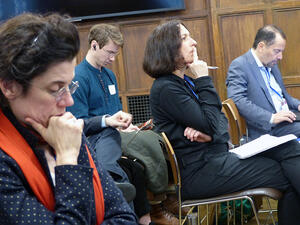
Theophile Penigaud de Mourgues, a postdoctoral associate with ISPS’s Democratic Innovations program, helped organize both Governing X conferences and shared his view that citizens’ assemblies should be more autonomous from the often-opaque influence of organizers.
“It’s concerning,” Penigaud de Mourgues said. “Because arguably the way the process is shaped partly determines the outcome.”
He said the report resulting from the French Convention on End-of-Life took a structure decided beforehand by the facilitation team and that citizen-initiated proposals emerging from deliberations on how to organize the report had little chance to shape the final product.
“Obviously we don’t want these new democratic innovations to be mere political artifacts,” he said. “We want citizens’ assemblies to be capable of speaking by themselves.”
Chloé Santoro, a doctoral student in political philosophy at the Logiques de l’agir laboratory at the University of Franche-Comté, participated as a panelist at the ISPS conference. She said the choices made regarding the timing, methods, and formalization of the votes she observed at the French convention on end-of-life issues had a considerable influence on both the conduct and the results of the convention.
“Voting times should not be seen as soundings or a switch to turn on the light briefly in a dark room to get your bearings,” Santoro said. “While voting does provide visibility and accessibility to the content of the deliberation, it is more like a classification system. It organizes scattered elements and gives them meaning according to specific pre-identified needs. To this extent, it becomes essential to determine who has the legitimacy to identify these specific needs, to discriminate between what is relevant and what is not, and to choose a classification system accordingly.”
Marjan H. Ehsassi, a strategic policy advisor, practitioner, and advocate for citizens’ assemblies, is the executive director of the Federation for Innovation in Democracy (FIDE) North America, a fellow for the future of democracy at the Berggruen Institute, and senior innovations fellow at Ohio State University’s Institute for Democratic Engagement and Accountability (IDEA). She served as a guarantor for the French convention on end-of-life issues, helping to oversee its impartiality, pluralism, and diversity of voice.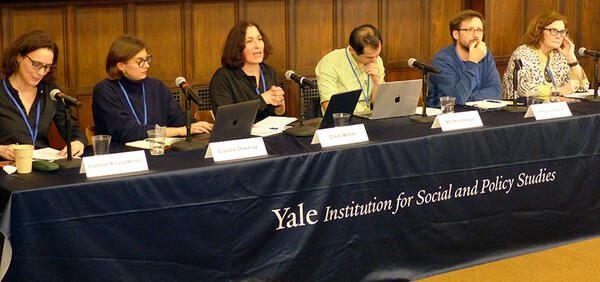
Her research focuses on the need to enhance power sharing among citizens and assembly organizers. At the Yale conference, Ehsassi recommended citizen involvement from the very beginning of a convention and on various committees and follow-up and enforcement mechanisms when it ends to ensure government accountability.
In addition, she said that organizers could better ensure power sharing by replacing abstract terminology such as “agenda setting” and ways to “give ownership” with concrete procedures designed to achieve stated goals.
“Instead of words that are vague and ambiguous, we should use more powerful and direct language,” Ehsassi said. “Clear language that shifts power to participants such as shared decision-making, co-responsibility and co-creation.”
Miguel Von Fedak, a Yale undergraduate majoring in Ethics, Politics, and Economics, observed the end-of-life convention as a researcher. He interviewed citizen participants to the convention with a focus on the 25% minority who opposed assisted dying and those who belonged to marginalized backgrounds. In a controversial move, the convention’s governance committee had decided to create opinion groups allowing people with minority views to find each other.
Fedak’s interviews reveal how the longer the opinion groups were maintained, the more the convention divided into isolated subgroups. He found those who held dissenting voices expressed frustrations with the procedure, in part because of domineering participants and preconceptions that made those with minority opinions feel their viewpoints were not taken seriously.
“They weren’t being respected,” Fedak said. “And it seemed that they felt like that just made them less important, less part of the deliberation.”
Colin Scicluna, head of cabinet to the European Union’s European Commission’s vice president for democracy & demography, led a panel discussion on the international perspective on citizens’ assemblies and other democratic innovations governance. Topics included the ongoing internal evolution of citizens’ assemblies in Ireland, governing permanent citizens’ assemblies in Belgium, and governance of the 2021 Global Citizens’ Assembly on the climate and ecological crisis.
Alexandra Cirone, an assistant professor of government at Cornell University visiting Yale as a fellow with the ISPS Democratic Innovations program, moderated a roundtable discussion on whether citizen’s assemblies should act more like sovereign legislatures.
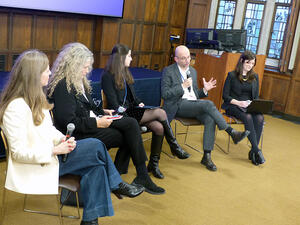
Thierry Beaudet, the elected president of French Economic, Social, and Environmental Council — the country’s third legislative chamber, now in charge of organizing citizens’ assemblies — said that citizens’ assemblies can help to break a circle of distrust that has developed between the people and their government.
“I really believe that consultative citizen assemblies are a very important, very encouraging element for rebuilding confidence in democracy and in representative democracy,” Beaudet said. “I do not see it as a competition or substitution at all, but as complementarity.”
In contrast, Landemore wants to see self-ruling citizens’ assemblies with a legislative power of their own, insisting that these assemblies are a new form of representative democracy in competition with elected assemblies. While she advocates for radical change, she noted that any such changes in the long term should not come at the cost of immediate chaos. She said that as a concerned citizen she would not want to undermine the stability of democracies that are showing signs of fragility.
“At the same time, as a theorist, I think it is my duty — it’s my job — to question the foundations of our system and point out their flaws,” she said. “I think there’s got to be a way that we can be critical and constructive at the same time. And that we can really think hard about radical reforms without playing into the hands of populists and enemies of democracy.”
Watch videos of the full “Governing Citizens’ Assemblies” conference